(最新)仁爱版英语九年级上册知识点汇总一
- 格式:pdf
- 大小:12.72 KB
- 文档页数:4
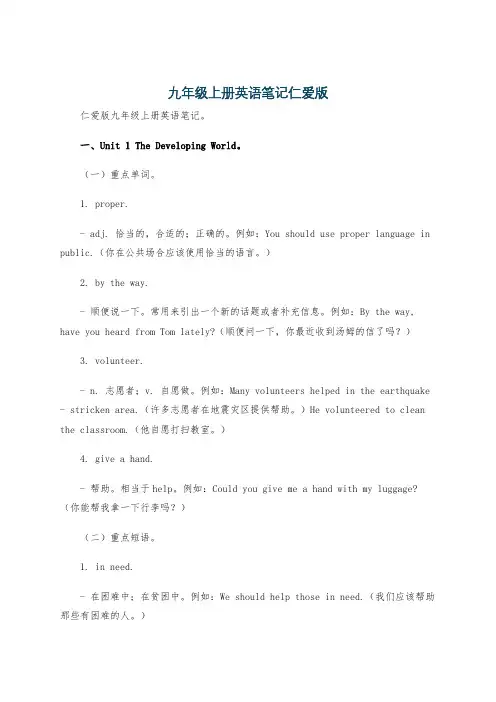
九年级上册英语笔记仁爱版仁爱版九年级上册英语笔记。
一、Unit 1 The Developing World。
(一)重点单词。
1. proper.- adj. 恰当的,合适的;正确的。
例如:You should use proper language in public.(你在公共场合应该使用恰当的语言。
)2. by the way.- 顺便说一下。
常用来引出一个新的话题或者补充信息。
例如:By the way, have you heard from Tom lately?(顺便问一下,你最近收到汤姆的信了吗?)3. volunteer.- n. 志愿者;v. 自愿做。
例如:Many volunteers helped in the earthquake - stricken area.(许多志愿者在地震灾区提供帮助。
)He volunteered to clean the classroom.(他自愿打扫教室。
)4. give a hand.- 帮助。
相当于help。
例如:Could you give me a hand with my luggage?(你能帮我拿一下行李吗?)(二)重点短语。
1. in need.- 在困难中;在贫困中。
例如:We should help those in need.(我们应该帮助那些有困难的人。
)2. come for a visit.- 来参观;来访问。
例如:My friends will come for a visit next week.(我的朋友们下周将来参观。
)(三)重点句型。
1. Have you come back from your hometown?- 这是一个现在完成时的一般疑问句。
其结构为“Have/Has+主语+过去分词+其他”。
回答可以是Yes, I have.或者No, I haven't.2. There goes the bell.- 这是一个倒装句。
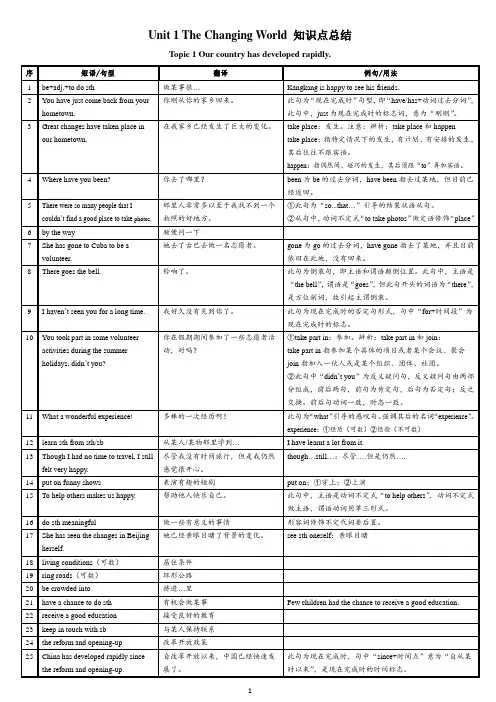
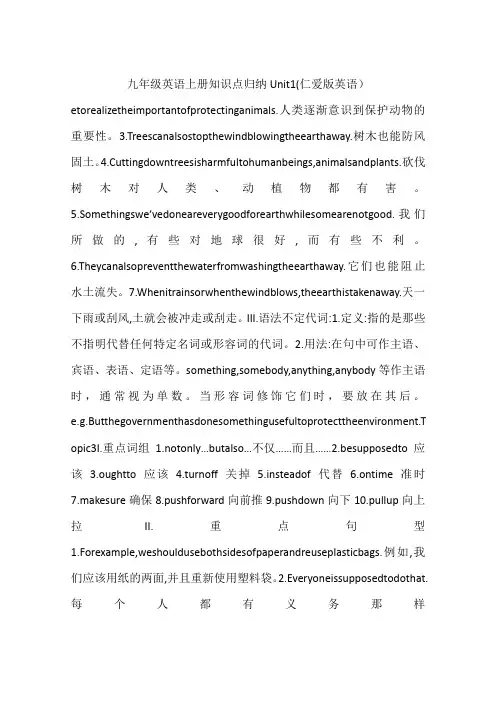
九年级英语上册知识点归纳Unit1(仁爱版英语)etorealizetheimportantofprotectinganimals.人类逐渐意识到保护动物的重要性。
3.Treescanalsostopthewindblowingtheearthaway.树木也能防风固土。
4.Cuttingdowntreesisharmfultohumanbeings,animalsandplants.砍伐树木对人类、动植物都有害。
5.Somethingswe’vedoneareverygoodforearthwhilesomearenotgood.我们所做的,有些对地球很好,而有些不利。
6.Theycanalsopreventthewaterfromwashingtheearthaway.它们也能阻止水土流失。
7.Whenitrainsorwhenthewindblows,theearthistakenaway.天一下雨或刮风,土就会被冲走或刮走。
III.语法不定代词:1.定义:指的是那些不指明代替任何特定名词或形容词的代词。
2.用法:在句中可作主语、宾语、表语、定语等。
something,somebody,anything,anybody等作主语时,通常视为单数。
当形容词修饰它们时,要放在其后。
e.g.Butthegovernmenthasdonesomethingusefultoprotecttheenvironment.T opic3I.重点词组1.notonly…butalso…不仅……而且……2.besupposedto应该 3.oughtto应该 4.turnoff关掉 5.insteadof代替 6.ontime准时7.makesure确保8.pushforward向前推9.pushdown向下10.pullup向上拉II.重点句型1.Forexample,weshouldusebothsidesofpaperandreuseplasticbags.例如,我们应该用纸的两面,并且重新使用塑料袋。
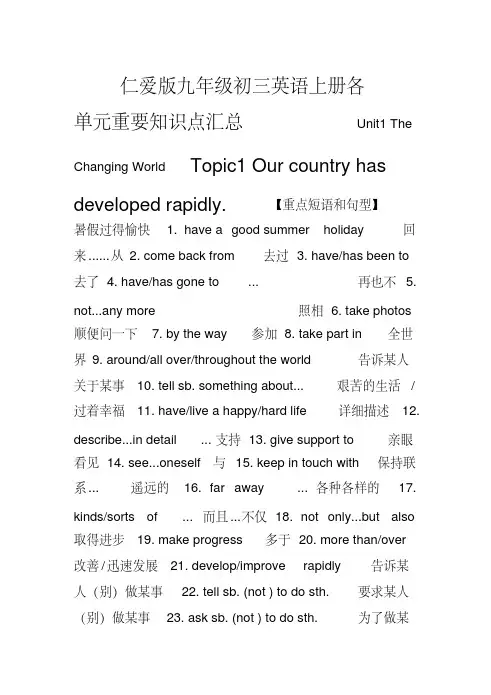
仁爱版九年级初三英语上册各单元重要知识点汇总Unit1 The Changing World Topic1 Our country hasdeveloped rapidly. 【重点短语和句型】暑假过得愉快 1. have a good summer holiday 回来......从2. come back from 去过 3. have/has been to去了 4. have/has gone to ... 再也不 5. not...any more 照相 6. take photos 顺便问一下7. by the way 参加8. take part in 全世界9. around/all over/throughout the world 告诉某人关于某事10. tell sb. something about... 艰苦的生活/ 过着幸福11. have/live a happy/hard life 详细描述12. describe...in detail ... 支持13. give support to 亲眼看见14. see...oneself 与15. keep in touch with 保持联系... 遥远的16. far away ... 各种各样的17. kinds/sorts of ... 而且...不仅18. not only...but also 取得进步19. make progress 多于20. more than/over 改善/迅速发展21. develop/improve rapidly 告诉某人(别)做某事22. tell sb. (not ) to do sth. 要求某人(别)做某事23. ask sb. (not ) to do sth. 为了做某事24. in order to do sth. 不得不做某事25. have to do sth. 的...对于某人来说做某事是+for sb. to do sth. 形容词It's +26. 为什么不做某事27. why not do sth. 成功地做某事28. succeed/be successful in doing sth. 梦想做某事29. dream about doing sth. 正在做某事/ 听见某人做/看见30. see/hear sb. do/doing sth.【重点语法】现在完成时现在完成时的基本结构. 一其他+动词的过去分词+have/has+ 肯定句:主语其他+ 动词的过去分词+have/has+not+否定句:主语一般疑问句:其他+ 动词的过去分词+主语Have/Has+ 其他)+过去分词+主语have/has+一般疑问句(+特殊疑问句:特殊疑问词现在完成时的用法. 二现在完成时用来表示过去已经完成的动作对现在造成影响或后果。
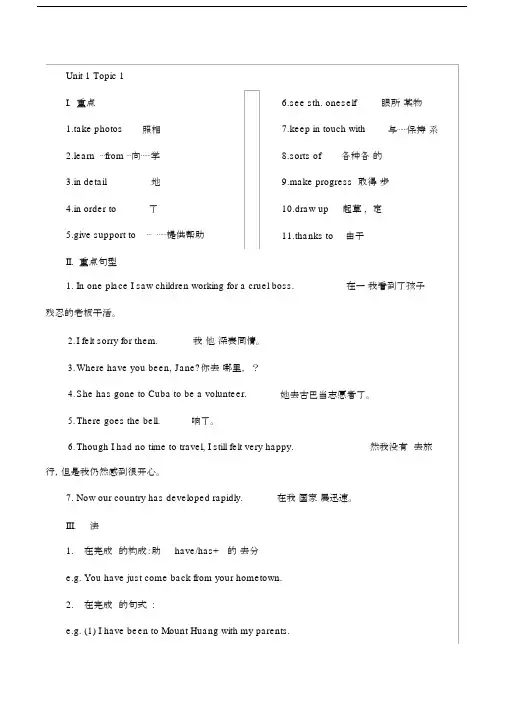
Unit 1 Topic 1I. 重点 6.see sth. oneself眼所某物1.take photos照相7.keep in touch with与⋯⋯保持系2.learn ⋯from ⋯向⋯⋯学8.sorts of各种各的3.in detail地9.make progress 取得步4.in order to了10.draw up起草 , 定5.give support to ⋯⋯⋯提供帮助11.thanks to由于II. 重点句型1. In one place I saw children working for a cruel boss.在一我看到了孩子残忍的老板干活。
2.I felt sorry for them.我他深表同情。
3.Where have you been, Jane?你去哪里,?4.She has gone to Cuba to be a volunteer.她去古巴当志愿者了。
5.There goes the bell.响了。
6.Though I had no time to travel, I still felt very happy.然我没有去旅行,但是我仍然感到很开心。
7. Now our country has developed rapidly.在我国家展迅速。
III.法1.在完成的构成:助 have/has+ 的去分e.g. You have just come back from your hometown.2.在完成的句式 :e.g. (1) I have been to Mount Huang with my parents.(2)I haven ’t seen him for a long time.(3)Where have you been?(4) —— Have you ever cleaned a room?—— Yes, I have. / No, I haven’t.3. have/ has been与 have/has gone的区have/has been to sp.表示曾到某地—— have/has gone to sp.表示已去了某地e.g. (1) I have been to Mount Huang with my parents.(2) She has gone to Cuba to be a volunteer.Unit 1 Topic 2I.重点8.be short of缺乏1.get lost迷路9.take measures to do sth.采取措施2.each other彼此做某事3.at least至少10.be known as ⋯作⋯⋯而著名4take place生11.work well in doing⋯在⋯⋯方面起作用5because of因12.a couple of一些6.be strict with sb.某人格要求13keep up with赶上 , 跟上7.carry out行II.重点句型1. Have you found him yet?你已找到他了?2.——I really hate to go shopping.我的确物。
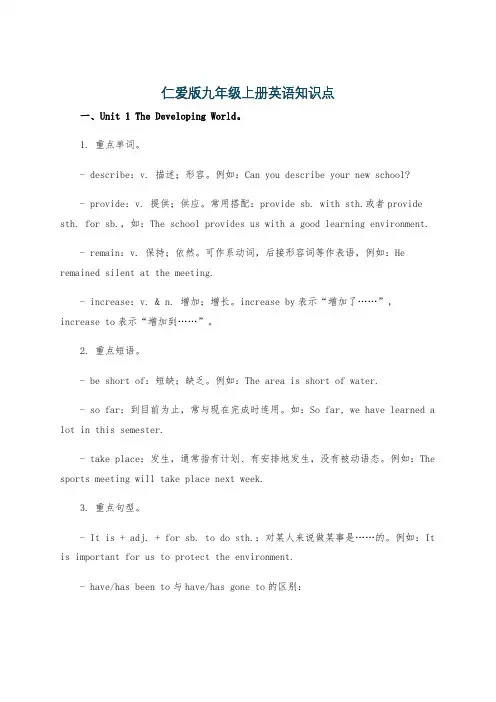
仁爱版九年级上册英语知识点一、Unit 1 The Developing World。
1. 重点单词。
- describe:v. 描述;形容。
例如:Can you describe your new school?- provide:v. 提供;供应。
常用搭配:provide sb. with sth.或者provide sth. for sb.,如:The school provides us with a good learning environment.- remain:v. 保持;依然。
可作系动词,后接形容词等作表语,例如:He remained silent at the meeting.- increase:v. & n. 增加;增长。
increase by表示“增加了……”,increase to表示“增加到……”。
2. 重点短语。
- be short of:短缺;缺乏。
例如:The area is short of water.- so far:到目前为止,常与现在完成时连用。
如:So far, we have learned a lot in this semester.- take place:发生,通常指有计划、有安排地发生,没有被动语态。
例如:The sports meeting will take place next week.3. 重点句型。
- It is + adj. + for sb. to do sth.:对某人来说做某事是……的。
例如:It is important for us to protect the environment.- have/has been to与have/has gone to的区别:- have/has been to表示“去过某地(已经回来)”,例如:I have been to Beijing twice.- have/has gone to表示“去了某地(还没回来)”,例如:He has gone to Shanghai on business.二、Unit 2 Saving the Earth。
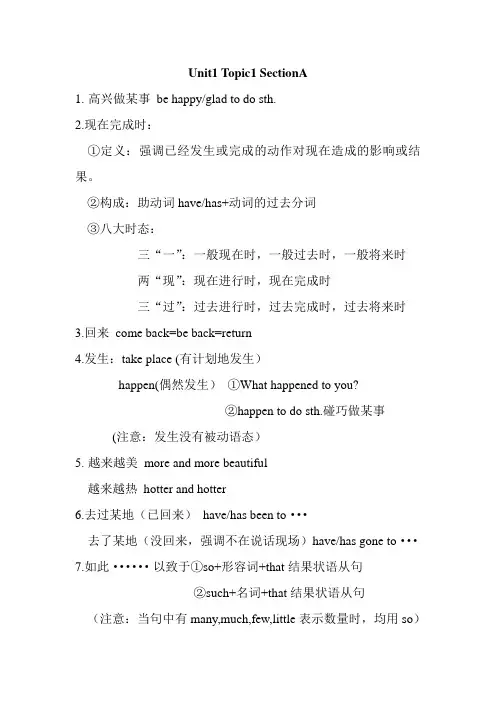
Unit1 Topic1 SectionA1.高兴做某事be happy/glad to do sth.2.现在完成时:①定义:强调已经发生或完成的动作对现在造成的影响或结果。
②构成:助动词have/has+动词的过去分词③八大时态:三“一”:一般现在时,一般过去时,一般将来时两“现”:现在进行时,现在完成时三“过”:过去进行时,过去完成时,过去将来时3.回来come back=be back=return4.发生:take place (有计划地发生)happen(偶然发生)①What happened to you?②happen to do sth.碰巧做某事(注意:发生没有被动语态)5.越来越美more and more beautiful越来越热hotter and hotter6.去过某地(已回来)have/has been to···去了某地(没回来,强调不在说话现场)have/has gone to···7.如此······以致于①so+形容词+that结果状语从句②such+名词+that结果状语从句(注意:当句中有many,much,few,little表示数量时,均用so)8.拍照take photos=take pictures9.顺便问一下by the way在去······的路上on the way to···挡道,妨碍in the way用这方式in this way10.铃响了. There goes the bell.=That’s the bell.=The bell is ringing.11.来come--came--come 变成become--became--become去go--went--gone 带走take--took--taken是be--was/were--beenUnit1 Topic1 SectionB1.现在完成时句式变化:肯定句:He has cleaned the room.否定句:He hasn’t cleaned the room.一般疑问句:Has he cleaned the room?肯定、否定回答:Yes,he has. / No,he hasn’t.特殊疑问句:What has he done?2.参加,加入①take part in=join in=be in(后跟活动)②join后跟组织,join sb.3.以···为食feed on=live on喂养feed---食物food流血bleed---血液blood4.看见see--saw--seen 喂养feed--fed--fed学习learn--learned/ learnt--learned/ learnt制作;使make--made--made拥有;吃;喝have--had--had感觉feel--felt--felt 放置put--put--put做,干do--did--done 飞,放飞fly--flew--flown阅读read--read--read 遇见meet--met--met5.experience①经历:可数名词②经验:不可数名词experienced为形容词“有经验的”6.感叹句有三种:①What+名词②How+形/副③How+句子How time flies!(注意:“时间,风,雨,雪,三餐,人口,成功”等虽然是不可数名词,但若前面有形容词修饰时,必须用a/an)7.使役动词make的用法:①make sb.+形容词②make sb.+职务名词(职务名词前不能加a/an/the)③make sb. do sth.8.别的,其他的other+复数名词=others9.任何别的any other+单数名词(同一范围内比较)10.虽然though不能与but连用,因为because不能与so连用.11.没有时间做某事have no time to do sth.no=not a / not any12.交朋友make friends with13.put on 穿上;上演;增加(体重)14.①动名词做主语,谓语动词用单三②动词不定式做主语,谓语动词用单三③不可数名词/单数名词做主语,谓语动词用单三④特殊疑问词做主语,谓语动词用单三⑤不定代词做主语,谓语动词用单三⑥one of +the+形容词最高级+复数名词,谓语动词用单三⑦主语从句做主语,谓语动词用单三Unit1 Topic1 SectionC1.在过去in the past 目前,现在at present2.采访;面试interview采访者;面试者interviewer 被采访者;被面试者interviewee3.超过,多于more than=over4.亲眼所见see sth. oneself=see sth. with one’s own eyes=5.在20世纪60年代:in the 1960s在1960年:in 19606.挤进···be crowded intocrowd(动词:挤名词:人群,观众)crowded:形容词7.足够的enough ①enough+名词②形/副+enoughHe is old enough to make enough money.他足够大能挣足够的钱了。
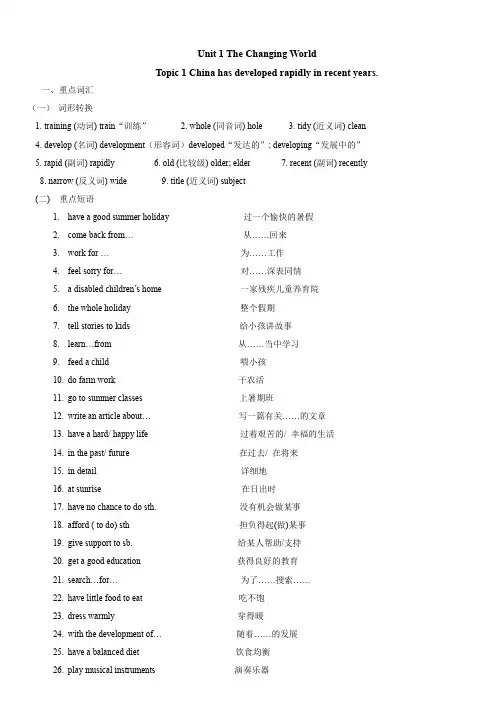
Unit 1 The Changing WorldTopic 1 China has developed rapidly in recent years.一、重点词汇(一) 词形转换1.training (动词) train“训练”2.whole (同音词) hole3.tidy (近义词) clean4.develop (名词) development(形容词)developed“发达的”; developing“发展中的”5.rapid (副词) rapidly6.old (比较级) older; elder7.recent (副词) recently8.narrow (反义词) wide9.title (近义词) subject(二)重点短语1.have a good summer holiday过一个愉快的暑假e back from…从……回来3.work for …为……工作4.feel sorry for…对……深表同情5. a disabled children’s home一家残疾儿童养育院6.the whole holiday整个假期7.tell stories to kids给小孩讲故事8.learn…from从……当中学习9.feed a child喂小孩10.do farm work干农活11.go to summer classes上暑期班12.write an article about…写一篇有关……的文章13.have a hard/ happy life过着艰苦的/ 幸福的生活14.in the past/ future在过去/ 在将来15.in detail详细地16.at sunrise在日出时17.have no chance to do sth.没有机会做某事18.afford ( to do) sth担负得起(做)某事19.give support to sb.给某人帮助/支持20.get a good education获得良好的教育21.search…for…为了……搜索……22.have little food to eat吃不饱23.dress warmly穿得暖24.with the development of…随着……的发展25.have a balanced diet饮食均衡26.play musical instruments演奏乐器27.sleep in the open air在户外睡觉28.study/ go abroad在国外学习/ 出国29.enter/ win/ lose a competition参加/ 赢得/ 输掉比赛30.enjoy Beijing Opera欣赏京剧ed to do sth.过去常做某事32.at sunrise在日出时33.go hungry变饿了34.fall ill得病/ 患病35.divide …into…把……分成……36.feel satisfied with…对……感到满足37.see …. oneself 亲眼看见……38.make progress取得进步39.thanks to多亏; 幸亏;由于40.stand for代表41.with the help of…在……的帮助下42.draw up an outline拟定提纲三、重点句型1.You have just come back from your hometown. 你刚刚从你的家乡返回。
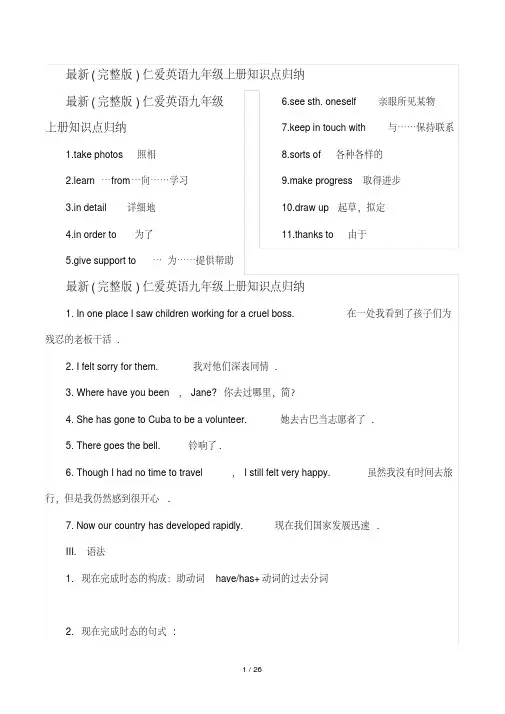
最新(完整版)仁爱英语九年级上册知识点归纳最新(完整版)仁爱英语九年级上册知识点归纳1.take photos 照相2.learn…from…向……学习3.in detail 详细地4.in order to为了5.give support to…为……提供帮助6.see sth. oneself 亲眼所见某物7.keep in touch with 与……保持联系8.sorts of各种各样的9.make progress 取得进步10.draw up 起草,拟定11.thanks to 由于最新(完整版)仁爱英语九年级上册知识点归纳1. In one place I saw children working for a cruel boss.在一处我看到了孩子们为残忍的老板干活.2. I felt sorry for them.我对他们深表同情.3. Where have you been, Jane? 你去过哪里,简?4. She has gone to Cuba to be a volunteer.她去古巴当志愿者了.5. There goes the bell. 铃响了.6. Though I had no time to travel, I still felt very happy.虽然我没有时间去旅行,但是我仍然感到很开心.7. Now our country has developed rapidly.现在我们国家发展迅速.III.语法1. 现在完成时态的构成:助动词have/has+动词的过去分词2. 现在完成时态的句式:e.g. (1) I have been to Mount Huang with my parents.(2) I haven’t seen him for a long time.(3) Where have you been?(4) ——Have you ever cleaned a room?——Yes, I have. / No,I haven’t.3. have/ has been与 have/has gone 的区别have/has been to sp.表示曾经到过某地—— have/has gone to sp.表示已经去了某地e.g. (1) I have been to Mount Huang with my parents. (2) She has gone to Cuba to be a volunteer.Unit 1 Topic 2最新(完整版)仁爱英语九年级上册知识点归纳1. get lost 迷路2. each other 彼此3.at least 至少4take place发生5because of 因为6.be strict with sb. 对某人严格要求7.carry out 实行8.be short of 缺乏9.take measures to do sth.采取措施做某事10.be known as…作为……而著名11.work well in doing…在……方面起作用12.a couple of一些13keep up with赶上,跟上最新(完整版)仁爱英语九年级上册知识点归纳1. Have you found him yet? 你已经找到他了吗?2. ——I really hate to go shopping. 我的确讨厌购物.——So do I.我也如此.3. But it seems that their living conditions were not very good.但是似乎他们的生活条件不太好.4. But great changes have already taken place in China recently.但是近来中国已发生了巨大的变化.5. Because of the one-child policy, now most families have only one child.由于我国独生子女政策的实行,现在大部分家庭只有一个孩子.6. What’s the population of the U.S.A.?美国的人口是多少?7. ——What’s more, the population in developing countries is growing faster.——So it is.而且,发展中国家的人口在更快地发展.的确如此.8. Our government has taken many measures to control the population.我们的政府已采取了许多控制人口的措施.III.语法:常用于现在完成时的时间状语:already, just , yet, ever, never, recently.e.g. 1. I have just called you.2. ——Have you ever been to France? ——No,I’ve never been to any European countries.3. ——Have you seen him yet?——Yes, I have seen him already.Unit 1 Topic 3最新(完整版)仁爱英语九年级上册知识点归纳1.get used to sth./ doing sth. 习惯于……2.as a matter of fact 事实上3.break out爆发4.live a hard life 过着艰难的生活5.in need of需要6.provide sb. with sth.= provide sth. for sb.提供某物给某人7.one’s success in doing sth. 成功完成某事8.obey strict rules 遵守严格的规则9.take drugs 吸毒10.aim to do sth. 目的是11.in the past sixteen years 在过去的十六年里12.at home and abroad 在国内外13.pay for 付款14.thousands of 成千上万的最新(完整版)仁爱英语九年级上册知识点归纳请你一定来参观.2Well, once they find people in deed, they decide on suitable ways to help them.他们一旦发现有人需要帮助,就选定适当的方式来帮助他们.3I think it is important for these people to feel good about themselves.我认为对于这些人来说,自我感觉良好是重要的.4The world has changed for the better.世界变得更加美好.5With the money, it has built thousands of schools and trained 2,300 teachers.它用这钱修建了数千所学校和图书馆并且培训了2300名教师.III.语法1.现在完成时: 常与for或since引导的时间状语连用,表示从过去某一时刻延续到现在.e.g. You have been in New York for a long time.The city has improved a lot since I came here a few years ago.2.构词法:合成词: home +work= homework派生词: use——useful, happy——unhappy仁爱英语九年级Unit2语言点归纳Unit 2 Topic 1最新(完整版)仁爱英语九年级上册知识点归纳1. chemical factory化工厂2. pour… into…把……排放到……3. in a bad mood处在不好的情绪中4. manage to do sth.设法去做某事最新(完整版)仁爱英语九年级上册知识点归纳最新(完整版)仁爱英语九年级上册知识点归纳7. no better than同…….一样差8. in pubic公开地9. all sorts of各种各样的10.in many ways 在许多方面最新(完整版)仁爱英语九年级上册知识点归纳1. Look, there are several chemical factories pouring waste water into the streams.看,有几家化工厂正往河里排放废水.2. Everything has changed.一切已发生了变化.3. How long have you been like this? 你像这样多长时间了?4. I’m always in a bad mood because I can’t stand the environment here.我的情绪总是很差因为我受不了这里的环境.5. However, not all people know that noise is also a kind of pollution and is harmful to humans’ he alth.然而,并非所有的人都知道噪音也是一种污染,而且有害于人类健康.III. 语法直接引语和间接引语1. Granny said,“I’m feeling even worse.”Granny said that she was feeling even worse.2. “ Do you still want to live here,Granny?” the journalist asked. The journalist asked Granny if she still wanted to live there.3. “ How is the environment around this place?” the journalist asked. The journalist asked how the environment around that place was.Topic 2最新(完整版)仁爱英语九年级上册知识点归纳1. as a result结果2. here and there到处3. in the beginning 一开始4. in danger 处于危险中5. cut down砍倒6. change sth. into sth.把……变成……7. prevent from防止8. greenhouse effect温室效应9. refer to提到10.deal with 处理11.take up 占据12.cut off中断最新(完整版)仁爱英语九年级上册知识点归纳1. As we know, none of us likes pollution.众所周知,没有人喜欢污染.mals.人类逐渐意识到保护动物的重要性.3. Trees can also stop the wind blowing the earth away.树木也能防风固土.4. Cutting down trees is harmful to human beings, animals and plants.砍伐树木对人类、动植物都有害.5. Some things we’ve done are very good for earth while some are not good.我们所做的,有些对地球很好,而有些不利.6. They can also prevent the water from washing the earth away.它们也能阻止水土流失.7. When it rains or when the wind blows, the earth is taken away.天一下雨或刮风,土就会被冲走或刮走.III. 语法不定代词:1. 定义: 指的是那些不指明代替任何特定名词或形容词的代词.2. 用法: 在句中可作主语、宾语、表语、定语等.something , somebody, anything,anybody等作主语时,通常视为单数.当形容词修饰它们时,要放在其后.e.g. But the government has done something useful to protect the environment.Topic 3最新(完整版)仁爱英语九年级上册知识点归纳1. not only…but also…不仅……而且……2. be supposed to 应该3. ought to 应该4. turn off关掉5. instead of代替6. on time准时7. make sure 确保8. push forward向前推9. push down向下10.pull up向上拉最新(完整版)仁爱英语九年级上册知识点归纳1. For example, we should use both sides of paper and reuse plastic bags. 例如,我们应该用纸的两面,并且重新使用塑料袋.2. Everyone is supposed to do that.每个人都有义务那样做.3. First, you ought to turn off the lights when you leave a room.首先,你离开房间时应该随手关灯.4. Easier said than done. 说起来容易做起来难.5. Well, actions speak louder than words.嗯,百说不如一做.6. There will be a lot of hard work to do tomorrow, so make sure you go to bed early tonight.明天有许多繁重的活要干,今晚一定要早睡.III. 语法并列句:由两个或两个以上并列而又相互独立的简单句构成.结构为:简单句+并列连词+简单句常用的并列连词有:and, or, but, while,not only… but alsoe.g. 1. The river is dirty and the temperature of the earth is rising.2. They work well,but they are slow and can’t r un for long.Unit 3 Topic1一.重点词语1.be able to=can能够,会2.can’t wait to do sth.迫不急待地做某事3.have a (good) chance to do sth.有(好)机会做某事4.practice doing sth.练习做某事5.be made by…被……制做;be made of/from…由……制成;be made in…在某地制造6.on business出差7.be simil ar to…和……相似8.translate…into…把……翻译成……9.have no/some trouble (in) doing sth.做某事没有/有些困难10.once in a while=sometimes/at times偶尔,间或11.whenever=no matter when无论何时12.as well as以及13.mother tongue 母语14.take the leading position处于领先地位15.encourage sb. to do sth.鼓励某人做某事16.call for号召二.重点句型1.Disneyland is enjoyed by millions of people from all over the world.世界上数以百万的人们都喜欢迪斯尼乐园.2.I hope I can go there one day. 希望有一天我能去那儿.3.English is widely spoken around the world.英语在世界上被广泛使用.4.It is also spoken as a second language in many countries.在许多国家它也被用作第二语言.5.It is possible that you will have some trouble.你可能会遇到一些麻烦.6.It’s used as the first language by most people in America,Canada,Australia ,Great Britain andNew Zealand.它被美国、加拿大、澳大利亚、英国和新西兰的大多数人用作第一语言.7.And two thirds of the world’s scientists read English.并且世界上三分之二的科学家用英语阅读.三.语法学习一般现在时的被动语态英语语态有主动语态和被动语态两种.主语是动作的执行者,叫主动语态.如:We clean the classroom.我们打扫教室.主语是动作的承受者,叫被动语态.如:The classroom is cleaned (by us).教室被(我们)打扫.1.被动语态的构成:助动词be+及物动词的过去分词+(by+宾语)其中by意为“被……;由……”,表动作的执行者.如:The glass is broken by that boy.玻璃杯是那个男孩打破的.be有人称、数和时态的变化,其肯定式、否定式、疑问式的变化规则与be作为连系动词时完全一样.如:English is widely spoken around the world. (肯定式)English is not widely spoken around the world. (否定式)Is English widely spoken around the world? (疑问式)Yes, it is./No,it isn’t.2.被动语态的用法:(1)在没有指明动作的执行者或者不知道动作执行者的情况下可用被动语态.如:This coat is made of cotton.这件大衣是棉制的.(2)要强调动作的承受者而不是执行者时,用被动语态.如:Her bike is stolen.她的自行车被偷了.3.主、被动语态的转换:主动语态:主语+及物动词谓语动词+宾语(+其它)被动语态:主语+be+及物动词的过去分词+by+宾语(+其它)注意:(1)主动、被动互转时,时态不变.(2)主动句的主语是代词的主格形式,变成被动态by的宾语时,要用宾格形式.如:(1) People grow rice in the south. Rice is grown (by people) in the south.(2)She takes care of the baby. The baby is taken care of (by her).四.交际用语:谈论英语的广泛使用1.---You’ll have a good chance to practice speaking English there.---You’re right.2.---But I’m not good at English. I’m a little afraid. ---Don’t worry.3.---Is Spanish similar to English? ---Not really.Topic 2最新(完整版)仁爱英语九年级上册知识点归纳1.by the way 顺便说一下2.depend on取决于……;依靠……3.be different from与……不同4.succeed in成功,达成5.make yourself understood表达你自己的意思6.on one’s way to 在某人去……的路上7.see sb. Off给……送行8.leave for…前往某地/leave…for…离开…去…9.in twenty minutes二十分钟之后10.written English笔头英语/oralEnglish英语口语11.generally speaking一般说来,大致上说12.as for sb./sth.至于某人/某物13.be close to…靠近……14.in person身体上,外貌上;亲自15.be found of…爱好……16.be forced to do sth.被迫做……/force sb.to do强迫某人做某事17.even worse 更糟的是最新(完整版)仁爱英语九年级上册知识点归纳1.Is Australia English the same as British English?澳式英语和英式英语一样吗?2.English is spoken differently in different English-speaking countries.不同的国家使用不同的英语.3.For example, there are differences between British English and American English.例如,在英式英语和美式英语之间有些不同点.4I can’t believe that I’m flying to Disneyland.我简直不敢相信我就要飞往迪斯尼乐园了.5.I hope I won’t have any difficulty.我希望不会遇到什么困难.6.Whenever you need help, send me an-mail or telephone me.无论何时你需要帮忙,给我发电子邮件或打电话.7.Not only children but also adults enjoy spending their holidays in Disneyland.不但青少年而且成年人也喜欢到迪斯尼乐园度假.三、语法学习用现在进行时表示将来现在进行时表示将来时,常有“意图”、“安排”(但不是固定不变的)或“打算”含义.它表示最近或较近的将来,所用的动词多是位移动词.如:例:I’m going.我要走了. When are you starting?你什么时候动身?Don’t worry. The train is arriving here soon.别着急,火车马上就到了.表示将来的现在进行时除了用于位移动词外,亦可用于某些非位移动词.如:My uncle is meeting us tomorrow.我叔叔明天会见我们.She is buying a new bike soon.她不久将买一辆新自行车.四.交际用语:谈论不同国家英语的不同点并了解交际中的身体语言1.I can’t follow you. Can you speak more slowly, please?2.Oh, it sounds interesting.3.If you want to succeed in making yourself understood, you need to know some of these differences4.---What’s up? ---The foreigner is asking for a ride.5.Generally speaking, American English is different from British English in pronunciation and spelling.Topic 3一、重点词语1.in public在公共场所2.at times=sometimes有时3.feel like doing=would like to do想要做……4..give up sth./doing sth.放弃5..turn to sb. for help求助于某人6..give sb. some advice on/about…给某人一些有关……的建议7..be weak in在……方面很差/be good at在……方面很好8..be afraid of doing sth.害怕做某事9.make mistakes犯错误10.take a deep breath深呼吸 11.the best time to do做某事最好的时间12.do some listening practice做些听力训练 13.reply to=answer回答14.advise sb. to do建议某人做某事(名词advice)二、重点句型1.Could you make yourself understood in the U.S.A?在美国,别人能懂得你的话吗?2.I don’t know what to do.我不知道该怎么办?3.At times I feel like giving up.有时我想要放弃.4.Try to guess the meanings of the new w ords, and get the main idea of the article.尽量猜测生词的意思,理解文章的大意.5.I dare not answer questions in class,because I’m afraid of making mistakes.我不敢在课堂上回答问题,困为我害怕犯错误.6.It’s an honor to talk with all of you.与在座的各位交谈是我的荣幸.7.But remember to choose the ones that fit you best.但是记住要选择最适合你的一种.8.I insist that you practice English every day.我坚持认为你们每天都应该练习英语.9.Believing in yourself is the first step on the road to success.自信是通往成功的第一步.三、语法学习wh- +to do wh-是指when, where, which, who(m)及how等连接词,它们和动词不定式连用,即为wh- +to do结构.这种结构在句中常作主语、表语和宾语,作宾语时可以转换为宾语从句.(对于谓语动词来说,wh- +to do这个不定式动词的动作是个尚未发生的动作,所以在转换成宾语从句时,通常须加情态动词或用将来时表示未来.)如:I don’t know what to do.=I don’t know what I should do.She can’t decide which to buy.=she can’t decide which she will buy.反之,如果主句中的主语与宾语从句中的主语一致时,宾语从句(由疑问词引导)通常可以与“疑问词+不定式”互相转换.如:I don’t know what I should do.=I don’t know what to do.如果不一致就不能转换.I want to know what Mary will do.(不能说:I want to know what to do.)四、交际用语:谈论如何学习英语1.---…, but I hate to speak English in public. ---You’d better not.2. I know it’s very important to learn English well. But it’s difficult for me. ---Me, too.3.Have you ever had any difficulties in studying English?4.---…, could you give us some advice on how to learn English well?---You’d better follow the tape and do some listening practice.I think the best time to remember new words is in the morning.Unit 4 Topic 1一、重点词汇:(一)词形转换:1. successful(副词)2. proper(副词)(动词) 4. leader(动词)5. succeed(名词)6. hero(复数)7. physics(形容词) 8. fix(同义词)9. introduce(名词) 10. far(比较级)(二)重点词组:1. go around环绕2. send…into… =send up…into…把……送入3. congratulations on sth祝贺某事4. be proud of为……而自豪5. be moved by为……而感动6. Thanks/Thank you for +n./ving sth感谢某人做的某事7. have physical examinations做体检8. in good/bad health处于好(不好)的身体状态9. can’t help doing情不自禁做……10. take turn to (do sth)轮流(做某事)11. no doubt无疑地12. as well as除……的之外,也13. for instance/example例如14. work on做……(方面)的工作15. depend on/upon 依靠,依赖16. turn on打开17. turn off关掉18. turn up 开大19. turn down关小20. click on用鼠标点击21. look forward to doing sth期待做某事二、重点句型:1. Now big plans are being made t o send up more satellites and even build a space station.现在中国正在计划发射更多的卫星,甚至建造一个空间站.(1) 句子“are being made”是现在进行时的被动语态,结构“be being+过去分词”.(2) 主动句中的宾补如果是不带to的不定式时,变成被动句后,成为主补的不定式必须带to,常见跟不带to的复合宾语的动词有see、feel、hear、make等.2. I’m moved by what Yang Liwei did.我被杨利伟所做的事感动了.(1) What Yang Liwei did是介词by的宾语从句,意为“杨利伟所做的事”(2) be moved by 为……而感动如:The students are moved by the old man’s story.同学们为那位老人的故事而感动.3. Generally speaking, we are in good health now.一般来说,我们现在的健康状况良好.(1) generally speaking“一般来说、大体上、大概”(2) in good/bad health处于好(不好)的身体状况.如:He has a cold, he is always in bad health.他感冒了,他的身体状况总是不好.4. We couldn’t help looking at the earth again and ag ain.我们忍不住再三地看着地球.(1) can’t/couldn’t help doing sth.忍不住做某事,不能停止做某事.如:I can’t help crying.我忍不住哭了.(2) again and again一再,屡次,如:The teacher has told him again and again.老师已屡次和他讲过了.5. I was able to fall asleep as soon as I got into the sleeping bag.We took turns to have a rest.一进入睡袋我就睡着了.我们轮流休息.take turns to (do sth.)轮流(做某事).The Browns take turns to look after the baby.布朗一家轮流照看这个婴儿.6. It has proved that China has made great progress in developing its spaceindustry.这证明了中国航天业的发展已取得了巨大的进步.It has proved that…这证明了……毫无疑问,电脑被商业,科技工作者广泛地应用.There is no doubt that…译为“毫无疑问”如:There is no doubt that we should protect the environment.毫无疑问我们应该保护环境.“village”.电脑使得世界变小了,就像一个“村庄”.make+宾语+形容词“使……怎样”如:We’ll try our best to make our country more and more beautiful.我们将尽全力使我产的国家越来越美丽.三、日常交际用语:Congratulations!Thanks for your introduction.Pleased to meet you. =Nice to meet you.It’s an honor to interview you now.What do you think of ShenZhou VI? =What are your thoughts about ShenZhou V I?四、重点语法:宾语补足语: 宾语补足语用来补充说明宾语,与宾语一起构成复合宾语.可作宾语补足语的有名词、形容词、副词、介词和动词不定式等.(一)、名词、形容词、副词、介词短语作宾语补足语.如:1.We call him Jim.(名词)我们叫他吉姆.2.We must keep our school clean every day.(形容词)我们必须每天保持校园清洁.3.Call him in, please.(副词)请叫他进来.4.Leave it on the desk.(介词短语)把它留在课桌上.(二)、动词不定式作宾语补足语可分为三种情况:1.跟带to的不定式作宾语补足语.常见的这类动词有:ask, tell, get, teach, want,invite, like, allow, wish, encourage等.如:Tell Jane to sing us a song.叫简给我们唱支歌.2.跟不带to的不定式作宾语补足语.常见的这类动词有“一感(feel)、二听(listen to,hear),三让(make, let, have),四看(look at, see, watch, notice)如:Let’s have a rest.让我们休息一会儿.但这种结构变成被动语态时,to必须加上.如:He was seen to leave the room with a book in his hand.有人见他手拿着一本书离开这个房间.3.跟带to或不带to的动词不定式作宾语补足语.这类动词只有help.如:Can you help me (to) wash my clothes ?你能帮我洗衣服吗?(三)、分词作宾语补足语可分为两种情况.1.现在分词作宾语补足语,经常表示正在发生的动作.可跟这类补足语的动词有:see,watch, hear等.如:I hear somebody singing in the next room.我听见有人在隔壁唱歌.2.过去介词作宾语补足语,经常表示被动.如:You need to have your hair cut.你需要理发了.Topic2一、重点词汇:1.be used for+ving被用做……2.true实现3.It’s said that据说4.during/in one’s life某人一生5.be known as以……(身份)而著名6.know/say for certain确切知道/肯定地说7.all the time一直、总是8.no longer=not…any longer不再(no more,not…any more)9.as long as只要10.as far as就……,尽……11.make a great contribution对…作出巨大贡献12.the rest of the time在其余地时间里13.at any time在任何时候二、重点句型:1.Because I’m not allowed to play games. 因为我不可以玩电脑游戏.allow“允许、准许”的意思.常用于以下几种形式:(1)allow+n./prep如:We can’t allow such a thing. 我们不容许这种事情发生.(2)allow sb.to do sth允许某人做某事如:She allowed me to go fishing.她允许我去钓鱼.(3)allow+doing sth允许做某事如:We don’t allow smoking in the reading-room.我们不允许在阅览室吸烟.(4)be allowed to do sth如:被允许做某事The students are allowed to play games on the play ground after school. 放学后学生们被准许在操场上做游戏.2.How do you say this in English?这用英语怎么说?其意思与What’s this in English相同.3.It’s made from wood.它用木材做的.(1)be made in在……地方制造,后接表示地点的名词.(2)be made of用……制造的,表示原材料未经化学变化,仍可看得出原材料.(3)be made from用……制造的,表示原材料经过化学变化,已看不出其原样.(4)be made by由(被)……(人)制作,后接表示人的名词或代词.(5)be made into(某物)被制成……(6)be made up of由……组成如:The TV set is made in Japan.这台电视机是日本生产的.These houses are made of stones.这些房子是由石头建造的.Paper is made from wood.纸是木头造的.Was this cake made by your mother?这蛋糕是你妈妈做的吗?Metal can be made into all kinds of things.金属可以制成各种各样的物品. The medical team is made up of ten doctors.这支医疗队由10位大夫组成.4.It’s used for helping us to improve our English.它用来帮助我们提高英语水平.(1)be used for+ving be used to do(被)用来做……强调用途或作用(2)be used as(被)作为……而用,强调被当作工具或手段来用.(3)be used by被……使用,by后跟人/物,强调使用者.如:Pens are used for writing.钢笔被用来写字.Wood is used to make paper.木材被用来造纸.English is used as a foreign language in China.英语在中国被当作外语使用. Recorders are often used by English teachers.英语老师经常使用录音机.5.People are surprised at the rapid development of robots.人们为机器人的飞速发展感到惊讶.句子中be surprised at…是一个系表结构,表示“对……感到惊讶”.而be surprised by…是一个被动语态形式,表示“被……所惊讶”.如:I am surprised at you.我对你的举动感到诧异.The manager was surprised by what he saw on the那位经理被眼前出现在电脑屏幕上的东西所惊讶.6.They will no longer want to be our servants,but our masters.它们将不再愿意做我们的人,而要做我们的主人.no longer(通常在动词前),not…any longer;not…any more(用于非正式文体中)都可表示“(过去曾……)现在不再……”如:She no longer lives here.She doesn’t live here any longer(或any more).她不在这儿住了.(过去她曾住这儿)7.This method worked well at night as long as the weather was goodand the stars could be seen.在夜间只要天气晴朗,能看见星星,这种方法就能很好地发挥作用.work well有效as long as只要三、日常交际用语:What’s it made of from? When/where was it made?It was invented in1879. What will our future be like?I hope your dream will true.四、重点语法:1、一般过去时的被动语态谓语部分的基本形式是be的过去式was/were+及物动词的过去分词.如:When was it made?它是什么时候制造的?It was made in1980.它是1980年制造的.When was the digital camera invented?数码像机是什么时候发明的?It was invented in1975.它是1975年发明的.2、时间前所用介词的速记歌年月周前要用in,日子前面却不行.遇到几号要用on,上午下午又是in.要说某日上下午,用on换in才能行.午夜黄昏须用at,黎明用它也不错.at也用在时分前,说“差”可要用上to.说“过”只可使用past,多说多练牢牢记,莫让岁月成蹉跎.Topic3一、重点词汇:1.travel by spaceship乘宇宙飞船旅行2.in the future3.in order to为了4.on the radio通过收音机5.take part in参加6.grow up成长、长大7.prefer…to喜欢……胜过……8.What’s worse更为糟糕的是 9.be worth it有好处,值得一干10.at a distance of相隔 11.send sb a message给某人发送信息二、重点句型:1.I don’t think aliens can be found in space.我认为外星人不可能出现在太空里.(1)当think,believe,suppose,imagine,expect等动词后的宾语从句含有not 的否定词时,该否定应移至主句,即否定主句的谓语动词.如:I don’t think it will rain tomorrow.我认为明天不会下雨.如果主句的主语是第二、三人称,否定式一般不转移.如:He supposes they won’t win the game.他猜想他们赢不了比赛.(2)can+be+过去分词,是情态动词构成的被动语态.如:This can’t be done in a short time.这不是短期内能完成的.2.It has been two days since we landed on Mars.自从我们登上火星以来已经两天了.it用作主语谈论时间,常与since连用.如:It is(或has been)three years since we left school.自从我们离开学校以来已经三年了.3.What’s worse,our water supplies were very low.更糟糕的是,我们的水供给是非常有限的.What’s worse更糟糕的是.类似结构还有:What’s more更有甚者;更为重要的是.4.It’s a quarter as big as the earth. 它是地球的四分之一大.倍数表示法:倍数+as+形容词/副词+as如:This box is three times as heavy as that one.这只箱子是那只箱子的三倍重.5.Mars goes around the sun at a distance of about228million kilom eters.恒星在相隔大约228000000千米的地方绕着太阳转动.(1)at a distance of相隔(2)at a distance在远处.如:The moon goes around the earth at a distance of380000km.月球在距地球38万千米的地方绕地球旋转.The police followed him at a distance.警察远远地跟着他.三、日常交际用语:Sound great!What is it about?What fun!I can’t wait.You think man can live in space one day?I Think so.I hope I can live there one day.四、重点语法:情态动词的被动语态:是由“情态动词+be+及物动词的过去分词”构成.如:Aliens can not be seen on the earth.在地球上不可能见到外星人. Other planets may be visited soon in the future.将来其他的星球也会有人登陆.Scientific research should be done carefully.应该认真地进行科学研究. These trees must be watered in time.这些树应该及时浇水.。
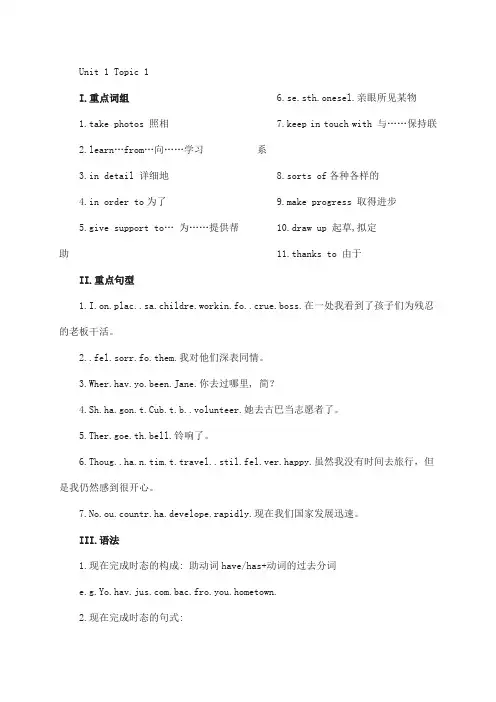
Unit 1 Topic 1I.重点词组1.take photos 照相2.learn…from…向……学习3.in detail 详细地4.in order to为了5.give support to…为……提供帮助6.se.sth.onesel.亲眼所见某物7.keep in touch with 与……保持联系8.sorts of各种各样的9.make progress 取得进步10.draw up 起草,拟定11.thanks to 由于II.重点句型1.I.on.plac..sa.childre.workin.fo..crue.boss.在一处我看到了孩子们为残忍的老板干活。
2..fel.sorr.fo.them.我对他们深表同情。
3.Wher.hav.yo.been.Jane.你去过哪里, 简?4.Sh.ha.gon.t.Cub.t.b..volunteer.她去古巴当志愿者了。
5.Ther.goe.th.bell.铃响了。
6.Thoug..ha.n.tim.t.travel..stil.fel.ver.happy.虽然我没有时间去旅行,但是我仍然感到很开心。
7.No.ou.countr.ha.develope.rapidly.现在我们国家发展迅速。
III.语法1.现在完成时态的构成: 助动词have/has+动词的过去分词.bac.fro.you.hometown.2.现在完成时态的句式:e.g.(1..hav.bee.t.Moun.Huan.wit.m.parents.(2) I haven’t seen him for a long time.(3) Where have you been?(4.——Hav.yo.eve.cleane..room?.——Yes..have..No..haven’t.3.have.ha.been.have/ha.gon.的区别have/has been to sp.表示曾经到过某地—— have/has gone to sp.表示已经去了某地e.g.(1..hav.bee.t.Moun.Huan.wit.m.parents. .(2.Sh.ha.gon.t.Cub.t.b..vo lunteer.Unit 1 Topic 2I.重点词组1. get lost 迷路2. each other 彼此3.at least 至少4take place发生5because of 因为6.b.stric.wit.sb.对某人严格要求.7.carry out 实行8.be short of 缺乏9.take measures to do sth.采取措施做某事10.be known as…作为……而著名11.work well in doing…在……方面起作用12.a couple of 一些13keep up with赶上,跟上II.重点句型1.Hav.yo.foun.hi.yet.你已经找到他了吗?2.——.reall.hat.t.g.shopping.我的确讨厌购物。
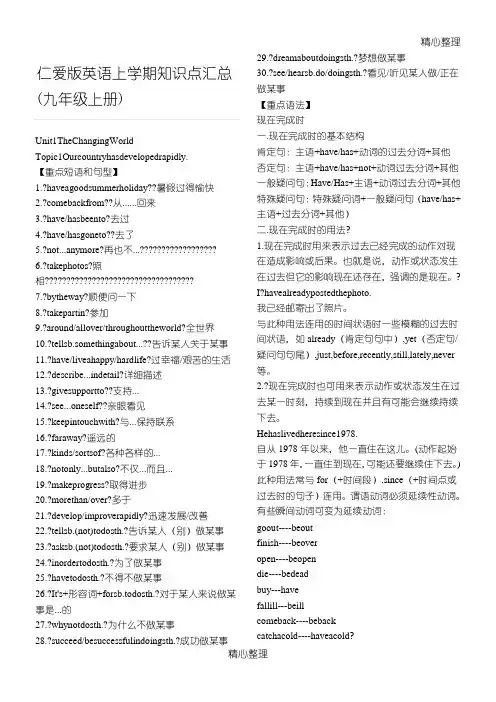
(精华版)仁爱版英语九年级上册知识点整理本文档对仁爱版英语九年级上册的知识点进行整理,旨在帮助同学们快速回顾和掌握所学内容。
以下是详细的知识点整理:1. 单元一:同一种动物,不同的国家1.1 单词与短语- animal:动物- continent:大洲- natural habitat:自然栖息地- endangered species:濒危物种- behavior:行为1.2 语法与句型- 形容词比较级的构成及用法- 原因状语从句的构成及用法- 定语从句的构成及用法2. 单元二:骑乘的美丽童话2.1 单词与短语- fairy tale:童话- kingdom:王国- castle:城堡- carriage:马车- prince:王子- princess:公主- wicked:邪恶的2.2 语法与句型- 一般过去时的构成及用法- 时间状语从句的构成及用法- 分词作定语的用法3. 单元三:发掘智慧的能力3.1 单词与短语- wisdom:智慧- knowledge:知识- invent:发明- experiment:实验- curiosity:好奇心- observe:观察3.2 语法与句型- 基数词与序数词的用法- 短语动词的构成及用法- 形容词作定语的用法4. 单元四:人人都是明星4.1 单词与短语- superstar:超级明星- talent:才能- concert:音乐会- audience:观众- performance:表演- fame:名声4.2 语法与句型- 定语从句的引导词与用法- 形容词与副词的比较级与最高级的构成及用法- 双重否定的句子构成及用法以上是对仁爱版英语九年级上册的知识点进行的精华整理,希望能对同学们的学习有所帮助。
更详细的内容请参考教材。
九年级英语上册:Unit 1 Topic1 1 Our country has developed rapidly.一·词组。
take place 发生,进行①keep in touch with…跟…保持联系②get in touch with…与…取得联系reform and opening-up 改革开放make progress 取得进展succeed in doing sth. 成功地做某事take photos 照相learn…from…向... 学习……put on 举办,上演,展出more than 超过,多于see sth. oneself 亲眼目睹某物have the chance to do sth. 有机会做某事far away 遥远的play a/an…part起……作用,有……影响in one's spare time 在某人空闲时间be happy/glad/pleased to do sth. 高兴做某事have a good summer holiday 过一个快乐的暑假a group of old people 一群老人be crowded into sp. 挤在一个地方receive a good education 接受好的教育not only … but also 不仅…而且satisfy people's needs 满足人们的需求enjoy good medical care 享受好的医疗照顾①remember the past 记住过去②live in the present 立足现在③dream about the future 展望未来make a tour abroad 出国旅游used to do sth. 过去常做某事be/get used to doing sth. 习惯做某事have no time to do sth. 没有时间做某事in the 1960s 在二十世纪六十年代in a short time 在短时间内二.句子1.Where have you been? 你已经去过哪了?I have been to Mount Huang with my parents. 我和我的父母去了黄山。
九年级上英语仁爱版知识点一、Unit 1:Greetings and Self-introduction(问候和自我介绍)本单元主要学习问候和自我介绍的基本表达方式以及相关的日常用语。
例如,问候语,自我介绍和打招呼。
1. Greetings(问候)在英语中,人们见面时常常会互相问候。
以下是一些常见的问候语:- Good morning!(早上好!)- Good afternoon!(下午好!)- Good evening!(晚上好!)- How are you?(你好吗?)- How's it going?(怎么样?)2. Self-introduction(自我介绍)在自我介绍时,我们可以告诉别人自己的姓名、年龄、国籍、家庭情况以及兴趣爱好等信息。
例如:- My name is Tom.(我叫汤姆。
)- I'm 14 years old.(我14岁。
)- I'm from China.(我来自中国。
)- I have a happy family.(我有一个幸福的家庭。
)- My hobbies are playing football and reading books.(我的爱好是踢足球和读书。
)二、Unit 2:School Life(学校生活)本单元主要学习与学校生活相关的词汇和表达方式,包括学科名称、课程安排、课间活动等。
1. Subjects(学科)英语中常见的学科名称有:- Chinese(语文)- English(英语)- Math(数学)- Science(科学)- History(历史)- Geography(地理)- Music(音乐)- Art(美术)- PE(体育)2. Class Schedule(课程表)同学们需要根据课程表安排每天的学习时间。
以下是一个示例:- Monday:- 8:00-9:00: Math- 9:10-10:10: Chinese- 10:20-11:20: Science3. School Activities(学校活动)学校的课间活动丰富多样,可以帮助同学们放松身心。
仁爱英语九年级上册知识点归纳Unit 1 The Changing WorldTopic3 The world has changed for better.一、重点短语1.on the phone 通过电话,在电话上2.have/has been in…某人在某地待了长时间3.get/be used to(doing) sth. 习惯于(做)某事ed to do sth. 过去常常做某事5.as a matter of fact/in fact事实上6.show sb. sth.=show sth. to sb.给某人展示某物7.homeless people 无家可归的人8.live a normal/happy/hard life 过着一种正常的/幸福的/艰苦的生活9.in need 在困难时,在贫困之中10.decide to dosth.决定做某事decide on sth. 决定某事make a decision 做决定11.offer sb.sth.=offer sth. to sb.给某人提供某物12.medical treatment 医疗救助13.provide sb.with sth.=provide sth. for sb.为某人提供某物14.feel good about oneself 自我感觉良好15.change for the better 变得更好16.get/be in trouble 陷入困境17.pick up 捡起,(用车)接(人或物)18.help sb. out 帮助某人摆脱困境19.the cause of 导致……的原因the result of ……的结果the reas on for ……的原因20.on purpose 故意21.have a problem with…有……问题22.think of… as…把……视为……23.raise one’s children抚养孩子24.afford sth. for sb. 为某人支付/担负某物 afford to do sth. 担负得起做某事25.make contributions to(doing)sth.在(做)某事方面做出贡献26.as a result 结果27.without th e help of…没有……的帮助lions of 数百万29.according to 据……所说,按……所报道30.plenty of 大量的二、单词转换1.visit v./n.参观,访问,游览 visitor n.参观者,来访者2.chemical adj.化工的,化学的 chemistry n.化学,化学物质3.homeless adj.无家的 homelessness n.无家可归4.treat v.对待,治疗 treatment n.疗法,治疗5.basic adj.基本的,基础的 base n.基础6.important adj.重要的 importance n.重要性,重要三、重点句型1.You have been in New York for a long time.你已经在纽约待了很长时间了。
单元知识点总结Name:_____________Unit 1 The changing worldTopic 1 our country has developed rapidly.Section A1.Kangkang is happy to see his friends.【知识点】be happy to=be glad to do sth. 做某事很开心2.There were so many people that I couldn’t find a good place to take photos.Mr. Brown is such a kind teacher that well like him.(U1T2SA)【知识点】如此...以至于:so....that; such...that【用法】so+adj./adv.+that+句子; such+(a/an)+adj.+n.+that+句子【注】当名词前有“many/much/few/little”时,要用so...that,即:so+many/much/few/little+n.+that+其它3.There goes the bell.【知识点】倒装句So do I.(U1T2SA)【知识点】倒装句,译为“我也是”So+助/情/Be+主。
;【否】neither/nor++助/情/Be+主。
Section B4.You took part in some volunteer activities during the summer holidays, didn’t you?【知识点】反意疑问句:【原则】前肯后否;前否后肯5.1)What a wonderful experience! 2)How interesting!【知识点1】experience:n. 经历(可数);经验(不可数)【知识点2】感叹句:what+(a/an)+adj.+n.(+主+谓)!how+adj./adv.+(+主+谓)!6.I think it makes me happy to help others.【知识点1】宾语从句:【识别】V+句子【知识点2】it makes sb.+adj.+to do sth. 做某个事使某人....7.Though I had no time to travel, I still felt very happy.【知识点1】though/although引导让步状语从句。
仁爱版英语九年级上册知识点汇总
Unit 1 The Changing World
Topic 1 Our country has developed rapidly.
一、重点词汇
(一)词形转换
1. rapid (副词) rapidly
2. relative(复数)relatives
3. recent (副词) recently
4. narrow (反义词) wide
5. Africa(形容词或人)
6.please(形容词)pleased
7. hide(过去式hid
8. radio(复数)radios 10.spare(同义词) free
11.medicine(形容词medical
(二)重点短语
1.have a good summer holiday 过一个愉快的暑假
2.not bad 不错,还可以
e back from…从……回来
4.take place 发生,举行
5.take photos 拍照
6.go to a summer school 上暑假学习
7.improve English 提高英语
8.by the way 顺便问一下
9.be a volunteer 当志愿者
10.during the summer holiday 暑假期间
11.a group of 一群
12.put on 穿上,上演
13.learn a lot from it 从中学到很多
14.chat online 网上聊天
15.see…oneself 亲眼目睹
16.the living conditions 生活条件
17.be crowded into 挤进……里
18.ring roads 环形路
19.receive a good education 接受良好的教育
20.keep in touch with 和…..保持联系
21.lose in touch with 和…..失去联系
22.in the future 在未来,在将来
23.relatives far away 远方的亲戚
24.work for …为……工作
25.feel sorry for…对……深表同情
26.a disabled children’s home一家残疾儿童养育院
27.the reform and opening-up 改革开放
28.satisfy people’s needs 满足人们的需求
29.medical care 医疗护理
30.what’s more 而且,更重要的是
31.make great progress 取得巨大的进步
32.succeed in doing sth. 成功地做某事
33.remember the past 记住过去
34.live in the present 立足于现在
35.dream about the future 展望未来
36.play an important part in 在……方面起重要作用
37.get together 集会,集聚
38.play hide-and-seek 捉迷藏
39.play cards 打扑克
40.play chess 下棋
41.in one‘ s spare time 在某人空闲的时间
42.chat on the Internet 在网上聊天
43.in recent years 在近年来
44.places of interest 名胜
45.make a tour abroad 到国外旅行
46.get a good education 获得良好的教育
47.make progress 取得进步
三、重点句型
1.You have just come back from your hometown. 你刚刚从你的家乡返回。
2.There goes the bell.= The bell is ringing. 铃响了。
3.Long time no see. 好久不见
4.It must be fun. 它一定很有趣
5.I haven’t seen you for a long time. 我好久没有见到你了。
6.He has seen the changes in Beijing himself. 他亲眼目睹了北京的变化。
7. I think it is important to remember the past, live in the present and dream about the
future. 我认为记住过去、立足现在、展望未来非常重要。
8.Thanks to / Because of the government’s efforts.由于政府的努力。
四、重点知识点
1.Though I had no time to travel, I still felt very happy this holiday!
尽管我没时间去旅游,但这个假期我仍然感到很愉快。
though 从属连词,用来引导让步状语从句,表“虽然;尽管”,不能与but连用。
如:Though he is poor, he is happy. = He is poor, but he is happy.
尽管他很贫穷,但是他很快乐。
2.To help others makes us happy.帮助他人使我们快乐
帮助他人使我们快乐。
To help others 不定式短语作主语相当于It’s very happy for us to help others.
五、重点语法
(一)现在完成时:表示过去已经发生或已经完成的某一动作对现在造成的影响或结果。
即“过去的动作 + 现在的结果”,强调结果。
如:
I have bought a new bike. (= I bought a new bike, and I have a new bike now.)
我已经买了一辆新的自行车。
(强调我现在有了一辆新车。
)
构成形式:助动词have / has + 动词的过去分词
1.肯定句: I have seen the film. 我已经看过这部电影。
否定句: I haven’t seen the film. 我没看过这部电影。
一般疑问句: Have you seen the film? 你看过这部电影了吗?
回答: Yes, I have. 是的,我看过了。
No, I haven’t. 不,我没看过。
特殊疑问句: What have you done? 你已经做了什么?
2.肯定句: He has finished the task. 他已经完成了任务。
否定句: He hasn’t finished the task. 他还没有完成任务。
一般疑问句: Has he finished the task? 他已经完成任务了吗?
回答: Yes, he has. 是的,他完成了。
No, he hasn’t. 不,他没有完成。
特殊疑问句: What has he finished? 他完成了什么?
(二)have/ has been to与 have/ has gone to
have/ has been to + 某地,到过某地,说话时人已经回来了。
have /has gone to + 某地,说明去了某地,说话时人还没回来。
如:
I have been to Beijing twice. 他去过北京两次。
---- Where is Jim? 吉姆在哪儿?
---- He has gone to the library? 他去图书馆了。